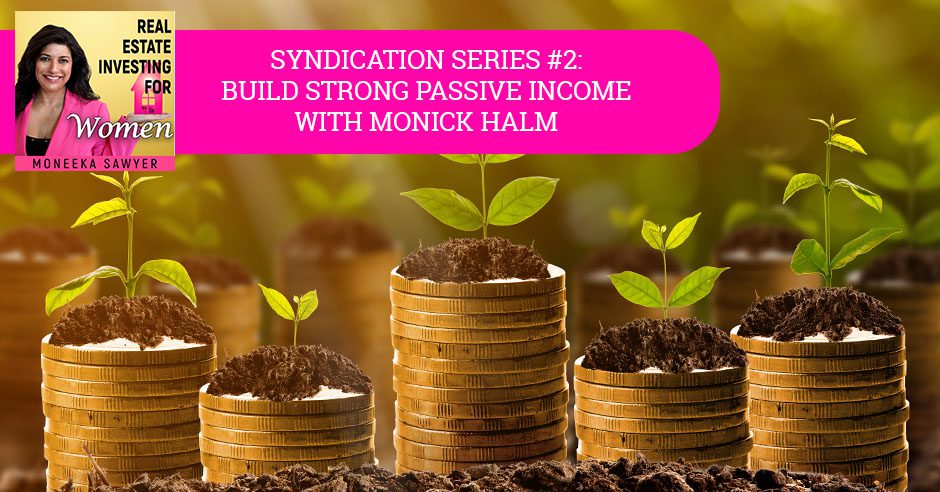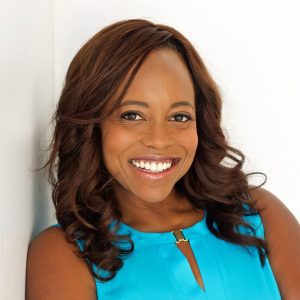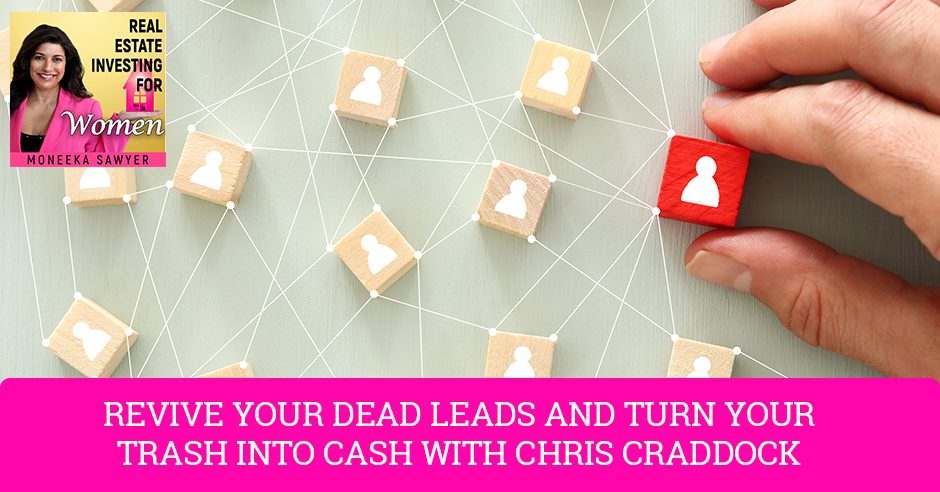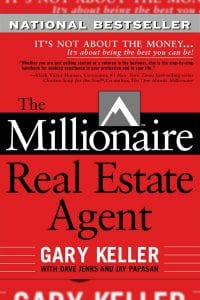Become the Bank for Passive Real Estate Income – Buy Notes
Moneeka Sawyer is often described as one of the most blissful people you will ever meet. She has been investing in Real Estate for over 20 years, so has been through all the different cycles of the market. Still, she has turned $10,000 into over $5,000,000, working only 5-10 hours per MONTH with very little stress.
While building her multi-million dollar business, she has traveled to over 55 countries, dances every single day, supports causes that are important to her, and spends lots of time with her husband of over 20 years.
She is the international best-selling author of the multiple award-winning books “Choose Bliss: The Power and Practice of Joy and Contentment” and “Real Estate Investing for Women: Expert Conversations to Increase Wealth and Happiness the Blissful Way.”
Moneeka has been featured on stages including Carnegie Hall and Nasdaq, radio, podcasts such as Achieve Your Goals with Hal Elrod, and TV stations including ABC, CBS, FOX, and the CW, impacting over 150 million people.
Syndication Series #2: Build Strong Passive Income with Monick Halm

Love to create passive income streams through real estate investing but don’t know where to start? On today’s show, returning guest Monick Halm does a presentation about real estate syndications and how to passively invest in real estate and earn double-digit returns. Monick is a real estate investor, syndicator, and developer with over 15 years of real estate investing experience in multi-family, industrial, mobile home parks, RV parks, flipping, and vacation rentals. She is also a bestselling author and host of the Real Estate Investor Goddesses Podcast. Tune in to find out how to get high returns with relatively lower risk. Plus, discover how you can avoid having to deal with the three T’s – tenants, toilets, and termites!
—
Watch the episode here
Listen to the podcast here
Syndication Series #2: Build Strong Passive Income with Monick Halm
Real Estate Investing For Women
Welcome to the Syndication Series where you’re going to learn what syndication is and how you can utilize it to build cashflow and grow your wealth. It’s an exciting strategy and I’m looking forward to sharing all of our guests with you. Now let’s get to the show.
—
Welcome to the show. We are going to do things a little bit differently. I am bringing back to the show, Monick Halm. We’ve had Monick on the show before and I had an interesting conversation with one of you guys. The question was, “I have money in my retirement program. I cannot afford to lose it but I want to have high returns.” You’re 65 and you want to retire soon. You can’t afford to lose the money but you want to get high returns with very low risk and you want to be very hands-off.
That was a tall order and I have no idea how to answer you but I do have resources. Monick is the resource that I actually reached out to because I know that she talks about ways to invest with high returns, low risk and hands-off. I wanted her to share her expertise with you. Also, it was very funny because I got that one question and then the same week, I got a very similar question for somebody else. It’s so funny how things come in groupings. This is the topic that people want to hear about.
I’m excited to present this to you. I’m going to have her introduce herself. I know you ladies have met her before because she’s been on the show. I’ve also asked her to do a full presentation because I want to make sure that I’m not interrupting and she captures everything that’s important for you to hear. It’s going to be a little different than normal. She’s doing a presentation. I will interrupt with some questions.
The other thing is she is actually doing a slideshow. If you’re a visual person and you want to see the slides, you can go to YouTube and look up Moneeka Sawyer or Real Estate Investing for Women and then you’ll be able to find this video. You can also go to Roku with Real Estate Investing 4 Women. You can look us up there. I’m going to turn it over to Monick. Monick, welcome back to the show.
Thanks for having me back to talk about one of my favorite things. I love to invest in real estate. I found it a little bit by accident, which I’ll talk about that. I’m going to share my slides. I’ll try to be as descriptive as I can for those who are reading. I’m going to be talking about real estate syndication, how to passively invest in real estate, earn double-digit returns and not have to deal with the three T’s. The three T’s are Tenants, Toilets and Termites. This is a way of possibly investing in real estate that is a pretty high return and lower risk.
Nothing is risk-free. I want to start by saying that. It can’t guarantee you returns. If anybody says that they will guarantee you a return then run in the opposite direction and we will guarantee it. This is a relatively lower-risk investment and I will share why. Before we get going, I’m going to briefly introduce myself and why I talk about this. I am a Real Estate Investor and I’m a Syndicator. Basically, syndication is crowdfunding real estate.
I bring groups of investors together to purchase real estate. I’ve been in real estate for many years. I have a little over 1,300 rental doors in seven states, raised over $35 million with my partners since 2016, with a real estate portfolio worth over $220 million. I’ve written the book, The Real Estate Investor Goddess Handbook and Wealth for Women: Conversations with the Team That Creates the Dream. My newest book is Investing in Real Estate from $1 to $1 Million, which is available as a digital download for free on my website, REIGoddesses.com.
I also have a show Real Estate Investor Goddesses. I’m a Real Estate Investment Mentor, Educator and Coach. That’s me in a nutshell and a little bit of my background for why I’m talking about this. First, let me briefly describe what is real estate syndication. In the simplest terms, syndication is a structure or relationship between multiple investors pool money together to fund a project, real estate or otherwise.
Investing in real estate syndication is essentially investing in a real estate enterprise as a passive investor, alongside multiple other investors. In English, it’s basically we bring together a group of investors that will passively invest. We’ll talk a little bit more about what all of those different roles are in a second.
First is syndication something for you? Maybe you can relate. If your real estate vision is big but you’re not sure if your bank account balance is big enough to fund it then you might be interested in syndication. If you have some money set aside but you’d like to be able to leverage it, spread the risk and you don’t want all your eggs in one basket then syndication might be a good fit for you. If your life is full and you’re not sure if you will have the time or other resources necessary to invest successfully then syndication could be a fit for you.
If you fit any of those things, I totally understand because that’s where I was. I want to share my story, which you may relate to. As with Moneeka, I’m a first-generation American. My parents are from Haiti. I have super supportive parents who were always like, “You can be anything you want as long as you’re a doctor, lawyer, professor, engineer.” I wasn’t into Math and Sciences so I went to law school. I ended up at Columbia Law and I was on a partnership track.
Success is doing what you love with who you love when you want to do it.
I have a picture of me walking. I’m in Japan, walking to our firm there. I was working for big international law firms, partnership track, six-figure income. I checked all the happy immigrant parent boxes. I’ve done everything right but I was miserable. At one point, I found myself in the emergency room. I remember that Tuesday morning and when the doctor told me that my appendix had ruptured, I’d have to spend several days in the hospital. I ended up spending nine days in the hospital. He said I’d have at least 30 days afterward to recover. My first thought when he said that was, “Thank God. I don’t have to go to work for at least 30 days.”
I had this incredible sense of relief. It didn’t hit me until that second how unhappy and miserable I was. I had taken it for granted that I was meant to be that unhappy but it took that moment to give me clarity about that is not normal. That is not good. That’s not okay. I had done exactly what I was told. I had followed the path exactly. I was that miserable and that unhappy. I knew I had to find a different way. They don’t know what causes appendicitis but I was sure it was stress from my job. That job was literally killing me. I had to find a different path.
That was not an easy thing to do because I did the path that I was told would lead to success. I did the path that my parents believed would lead to success. They didn’t know better. They taught me what they knew. I fell into real estate completely by accident. The only thing they’d ever taught me was to buy my own home. That was what they knew about real estate. Moneeka, you were lucky because your parents knew about real estate investing. You were born into it. I was not. My parents just knew to get a job, trade your time for money and then buy a house that you live in but it gives you no money.
At least, they said buy a house. I don’t know how many people whose parents didn’t even know that much.
At least I had that.
You had so much. It sounds like your parents adored you and wanted the best for you.
They did and they’re great parents. I love my parents. They definitely did the best they knew to do. They were very supportive.
I wanted to highlight something that you said, which I think is valuable. Ladies, this is something to think about. We’re talking about real estate but one of the things that Monick found in that hospital and I know I’ve been here too is how do we define success? She did everything right. I did the same thing. I did everything right. Our parents told us what success was going to look like and how we were going to get there because that’s the best that they could do. That’s what they knew.
The way that they define success is different than how we define success. We have had to create a new life based on our vision of success. That’s an important key for you ladies to keep in mind. How are you defining success? I love what Monick was talking about, “This might be for you, if.” If that is you, how are you defining success and what are the next steps? I wanted to highlight that success looks different for everybody.
For me, success is doing what you love. Being able to do what you love with who you love when you want to do it. That is success. After having spent lots of time doing things that were killing my soul, that was what it felt like being a lawyer and it literally was killing my body too. After having spent that much time being miserable, now I have the freedom to do work that I love and I’m passionate about and I have a passive income stream so I don’t have to work if I don’t want to.
I get to make a difference and spend time and vacation and do all of those things that I want to do when we’re allowed to leave the country and our homes. I have freedom. That’s success. I didn’t start there. I got there by a series of happy accidents. I was sharing that when I went to go buy my home. This was in 2005, towards the top of the last bubble. I live in Los Angeles, a very expensive market.
You understand being an expensive market. Those of you out there in the much cheaper markets probably cannot conceive of the prices that we have to pay. Even back in 2005, a starter home in a semi-decent neighborhood was upwards of $600,000, $700,000. I had a low six-figure income so that was challenging for me but a friend of mine that was in a similar boat suggested that we buy a duplex together. He would live on one side. I’d live on the other side.
The original plan was to get a property with two equal sides but we ended up finding this old craftsman that had a larger downstairs unit, a two-bedroom unit upstairs. It had a converted garage in the back which was a one-bedroom. We ended up each taking a bedroom in the bigger unit, renting out our upstairs, renting out our back house, even renting out our basement. I started the house hack before I knew that was the thing. I went, “This is awesome.” We’re paying our mortgage and I got tax benefits. This is great.

Passive Income: If you don’t want all your eggs in one basket, syndication might be a good fit for you.
My husband had a duplex. We got a single-family rental together. We started to flip houses when houses were on sale. By 2015, houses were not on sale. It was getting frustrating. Flipping houses is a short-term job. It’s like a short-term contract. You do it, fix it up, sell it and hopefully at a profit and then you have to start over.
I wanted something more passive. I started to look for a fourplex, which at the time was the largest thing I could think of. In LA, you cannot find anything that cashflows. It was pretty much impossible because it was going to cost a fortune and there was no money coming back from that. I ended up being introduced to this man that would become my mentor, Robert Helms, who is the host of The Real Estate Guys Radio Podcast.
He’s done hundreds of millions, maybe even over $1 billion worth of transactions at this point. We had a mutual friend. When I was telling our mutual friend, Kyle, how frustrated I was, he said, “My friend Robert Helms is going to be in LA tomorrow. You should come and meet him.” I met him and he’s the one that changed everything. It’s one ten-minute conversation and why I’m here talking to you. This is exciting.
He was super nice. He asked me what I was doing. I told him about the flipping and how that was getting challenging and looking for the fourplex in LA that that would not make cashflow. He said, “LA is a tough market. I always say live where you want to live, invest where the numbers make sense.” That makes total sense after you hear it. I always thought you had to invest where you could drive to your property, touch it, self-manage it. It never crossed my mind that I could invest outside of where I lived. Literally, that opened up the world to me.
The other thing he said was, “You can buy that fourplex by yourself but you’re limited to your own capital and credit. Alternatively, you could bring a group of investors together and you’d get 100, 200 units.” He started telling me about the benefits of that. My brain exploded right there. I was like, “What? That’s a thing? You can do that?” I got chills, “I want to do that.” That was very exciting to me to find out. I went home and told my husband that night. It’s like, “There’s a thing called syndication. We need to learn how to do that.”
The Real Estate Guys, Robert Helms and his partner, Russell Gray, were teaching a seminar on it in January of 2016. We went to that seminar and signed up with their program. We met Brad Sumrok. He was our apartment syndication mentor. We signed up with him. We went to tons of different events throughout that year and since to learn how to do that. I probably invested over $60,000 in education but it paid off.
We ended up syndicating and getting into a 109-unit mobile home park in North Carolina. We did 318 units in Dallas, 514 units in Atlanta, a 50, 51-unit townhome community and then 77-unit apartment community in Albuquerque, all in that first year. Over 1,000 units in that first year through syndication through bringing investors together. Two of those deals were passive.
Monick, you take things slowly, don’t you? You said only two of those were passive?
The mobile home park and the two in Albuquerque that we syndicated, we’re actively investing. We still passively invest in things, as well as actively invest in their benefits to both, which we’ll talk about in a minute. Other than the mobile home park, all of those things have been sold. We have new ones, a little over 1,300 in different asset classes, different states. It’s allowed us to diversify. It’s allowed us to scale, grow and a quantum leap in ways that I had never imagined possible. That’s why I’m very passionate about it.
I have a picture in a slide. It’s me but I’m actually wearing a tiara and I’m surrounded by a bunch of men. It was at a mastermind that I was in. First of all, 90% of our investors were men. I had been working with women but it came as this divine download to bring women into this game and especially invite them into syndication. I created Real Estate Investor Goddesses to bring women into this game.
My mission of helping 1 million women create financial freedom through real estate investing came as this divine download but not the how of it. I’m still figuring out the how. We’re ways from that but the what of it has come. It’s been great. The word’s been going out. As with you, Moneeka, I’m passionate about getting more women into this lucrative game of wealth-building. One of the ways that are great for women is with syndication because a lot of us are busy.
We have jobs, we have to homeschool, we have parents and kids to take care of and all of this stuff. This is a way of being able to get into real estate that is passive, that doesn’t take time past the vetting or some of you might be interested in being on the other side of it too, where you get to bring groups of investors together. You can benefit a lot by being on the active side, which is the side I mostly play on. Either way, there are a lot of benefits. Why would you want to do that?
First, it allows you to buy more than what you could afford by yourself. As a passive investor, you get to leverage OPM, other people’s money. It’s not just your money. It’s the money of all the other investors and often a bank too. We usually get financing as well as all of these investors that come in. You’re able to leverage OPM to get something much bigger than what you could afford by yourself.
Invest where the numbers make sense.
You also get to leverage OPT, other people’s time because somebody else is going off and finding the deal and putting it together and bringing all the investors together. You have to vet the deal and then send in your funds and wait for it to come back with friends. It allows you to spread the risk. It’s not all on you. The risk is spread. Also, as a passive investor, you have very little to no liability. You spread the wealth.
As a syndicator, I get to create an opportunity for many people to benefit. As a passive investor, you get all the benefits of being a real estate investor, like the tax benefits and otherwise, without the work. With a real estate syndication, there are a lot of benefits. It gives you the benefits of passive cashflow. You get a share of the monthly cashflow and equity that’s at the end when we sell. You get federal tax benefits. A lot of people don’t realize that. You have the assumption that the more you make, the more you pay in taxes. That’s what we’re told.
Higher-income, more taxes, except when it comes to real estate investing because of the way it’s structured. With the tax code, you often end up paying less. A lot of people will get into real estate, especially when they have very successful businesses. A good stabby CPA will say, “You should start investing in real estate because you’re paying too much in taxes.” Even though you’re making money with your real estate because of the way real estate is, it looks like a loss for tax purposes. You’ll pay less.
I have a very good friend. He’s a successful businessman. He found himself one year owing $500,000 to the IRS. He had always assumed the more you make, the more you pay in taxes. He had multimillion-dollar businesses and he found out about real estate. He bought an apartment building in Memphis. The apartment building is making money.
It was making six figures a year of income but it brought his tax bill from $500,000 to $0. He’s making more money. Not only did he make money but he saved on the money that did not have to go to Uncle Sam. It’s not what you make. It’s what you get to keep. In real estate investing, even as passive investors, you get to keep more.
I’ve said on this show many times that no matter how someone becomes rich, the rich always invest in real estate. That’s where they make the majority of their money. They make a huge amount of money in real estate. They also save a lot of money in real estate, which they can then grow again in other ways whether it’s in their business or real estate.
Monick has given you a cool breakdown of why the rich invest in real estate. What’s cool about real estate is that you don’t have to be rich. This is available to everybody, especially here in the United States. This is the most amazing country that way because this is not true elsewhere. The government actually supports everybody from a single mom all the way to the richest person on the planet in investing in real estate. We’re supported to do that. It helps us to grow true wealth and it helps to lower our tax bill. There are many good reasons to invest in real estate.
The government wants you to invest in real estate. That’s why they give these incentives in the tax code. It’s to get more people to invest in real estate. There’s a book called The Color of Law. It started in the 1940s after World War II. They thought that if people owned real estate, they would not be communists. It was a way of helping stop communism. Whatever the reason, it’s a good thing if you’re a real estate investor. It helps you out.
People who have a lot of money shift from being about income to being about wealth preservation. Real estate helps you preserve wealth, not just because it appreciates and some of these other benefits but because of the enormous tax benefits. That will help you save money off of your real estate income and it helps you pay less on more of your income, not all. I’m not a CPA but it helps you. Check with your CPA.
It is very beneficial, tax-wise. As I was talking about before, you can leverage OPM, other people’s money and other people’s time. When you’re in syndication, you’re able to do much bigger properties and their economies of scale and leverage in that way. Retirement savings came up because people are saying, “I have this money in my retirement account. I’d like to be able to find investments that make sense and that are lucrative, relatively safe and with self-directed retirement accounts.”
Not the account that your work’s going to put you in normally, which gives you a very limited menu of things that you can invest in, like some mutual funds and bonds. If you can self-direct your money then you can put it into real estate and get better returns. Also, with real estate, you get appreciation over time. Properties tend to go up in value but you can also force appreciation by doing targeted rehab, which is what we do with syndication.
We have a business plan. When we buy a property, we plan to add value to that property and appreciate the value. It’s worth more after a certain amount of years. We’ll sell and be able to recapture that. Even on paper, as the value of the building grows so does your net worth. It allows you to leave a legacy, which for many of us is one of the main reasons why we want to do this. Real estate since time immemorial, has been the main way that people have built, preserved and passed down wealth. It still remains the same way. That’s one of the best ways to build and leave a legacy.
It’s the feel-good business. That’s a win-win. I only invest in ways in which I can leave a property in a community better than we found it. In our syndications, that’s the focus and it feels good. It’s a wealth-building opportunity for everyone touched by our deals. That’s why I love it. Those are the benefits. Think about what are the benefits for you. What’s your why behind real estate investing or syndication? Depending on what are the why’s that are more important to you, there are certain deals that will give you more of those benefits or less so tap into your why behind them.

Passive Income: Don’t try to do a syndication without a qualified securities attorney. They make sure you know what you’re doing when you take on other people’s money.
What types of properties can be syndicated? Basically, anything can be syndicated. You can syndicate debt. Sometimes, it’ll be a fixed return. It’s a debt or a loan that we’re syndicating. You can syndicate equity, ownership stake in the property, raw land or single-family residential properties. I put an asterisk on the slide because syndications are generally for larger commercial projects. There’s a lot of expensive legal work that has to be done. I’ll talk a little bit more about the legal ramifications of this. It’s not something that I would recommend you go out and ask a bunch of people to give you money for a deal.
They’re governed under the Securities and Exchange Commission. It can be pricey to put one of these together. The numbers have to be justified. The deal has to be large enough to justify the legal costs of putting together a syndication. You won’t find a single-family residential property that is syndicated, unless it’s going to be used for something like a residential assisted living facility, a facility that where people are paying upwards of $4,000 a bed to be there and it’s a very high cashflowing business. Those get syndicated. Otherwise, it’s like a house to flip. Normally, you won’t see that but they could be if somebody wanted to do that. Multi-family apartment complexes, that’s very common, office space, retail, industrial, you name it, can be syndicated.
Who’s involved in the syndication? You’re going to hear the terms syndicator, sponsor, active investor and general partner. Those are all used interchangeably. That is to describe the individual or company or team that’s finding, acquiring and managing the real estate. They should have a history of real estate experience and the ability to underwrite and do due diligence on the properties. They’re the active investors. They’re the ones doing the work.
There are joint venture equity partners. Sometimes that’s my role in deals, where we have a group of investors and we’re not on the operation side or bringing in funds for the investment. We’re connecting our investors to operators that were part of the sponsorship team. With a JV or equity partner, it might help with financing. They’re reporting communications, tax documentation, that sort of thing.
Last but not least, there are passive investors sometimes called limited partners. Those are individuals who will invest in the syndication. They own a percentage of the real estate as a result. If it’s an equity deal or they’ll have a percentage, they’ll be part of the loan. If it’s debt, they’ll get all the benefits of property ownership, not involved with acquiring the property, arranging financing or doing any of the day-to-day management. They cannot be.
Think of it more like if you’re buying stock in Apple. You own a piece of Apple. If they do dividends then you would get your dividends. Otherwise, you have that ownership stake but you’re not going to call the company and say, “I want you to change this feature on the iPhone.” Our passive investors can call us and tell us what they’d like to change but if there is someone who’s managing it, gets to decide when to sell, what to do and who’s the team then that’s on the active investor side.
I’m going to share a fairly typical example of a 100-unit apartment building. This is one that we did. I’m going to round out the numbers to make this easier to understand. This is not a guarantee of results. This is not atypical for syndication. It’s fairly typical in terms of returns. This deal was a $5 million purchase price. The rehab budget was $500,000. We’re buying an apartment building, fixing up the units, getting them nicer so we could raise the rents to market rates because this property was underperforming.
There was a loan. We got a loan, 75%, $4.125 million so the interest rate was 5% at the time. It’s lower now. We had a downpayment of $1.375 million, closing costs of $200,000 and cash reserves of $75,000. We were raising $1.65 million. We rounded up 33 investors at $50,000 each. I won’t go through all of the various numbers. I’ll highlight the end result. After the total cash flow, the whole profit was $51,575 after five years. Basically, it more or less doubled the money of the investor after five years. Part of that was in cashflow, a little over $23,500 in cashflows. Sales proceeds were close to $78,000. That was the profit.
That’s not bad for something that is passive. That is not atypical for these types of syndications. On the active investor side, that also invests $50,000 in the same deals as an active investor, you get a share of the cashflow, the acquisition fee, there’s also asset management fee and you get a share of the equity for putting together the deal and then there are fees for managing it. In this case, an active investor who also put in $50,000 had the same profit that all the other equity investors did, $51,575. There’s a 3% acquisition fee of $49,500, 1.5% asset management fee, $60,257, 15% deal sponsor equity share of $116,700. The total sponsorship return was $287,032 on a $50,000 and sweat equity.
There’s a lot of sweat equity in that but that’s the return. If there was a team doing that, all the acquisition fee, asset management and deal sponsor equity would be split amongst the team members. You can get three times or more of the returns by being on the active side and doing the deal. It can be very profitable either way. Does this sound like something you might like to try?
It’s one of the nice things about it as a passive investor. You can learn but you have to vet the deal and then wait for it to come back with friends. For those of you who are interested in being on the active side, I have a warning slide here. Do not try to do a syndication without a qualified securities attorney. You could win yourself a very hefty penalty, an orange jumpsuit and some jail time. I want free housing but not that way.
They make sure you know what you were doing when you take on other people’s money. You can’t usually advertise an opportunity. It’s very regulated in terms of who can invest with you and how. It’s going to be people with whom you have a substantial pre-existing relationship and they have to be sophisticated enough to understand the deal or you’re only dealing with accredited investors. For those of you who don’t know what an accredited investor is some people think it’s like, “I’m not accredited. I haven’t taken the test. I don’t have the certificate.” There’s no certificate and test. You qualify either through your income or through your net worth.
If you have an income as an individual of $200,000 or as a married couple of $300,000 per year, you’ve had it for at least two years with a reasonable expectation that you will in the subsequent year, you are an accredited investor. If you have a net worth of $1 million or more, not including your primary residence then you are an accredited investor. Congratulations. You are part of the 8% of the population who are. Most people do not fall under that but if you do, you’re an accredited investor. That will allow you to take advantage of more of these opportunities.
Invest in ways in which you can leave a property in a community better than you found it.
Some of them are for accredited investors only some are for both but you do have to have a pre-existing relationship with the person bringing the deal. If you are trying to syndicate then you need to understand when you can take credit, when and how you can take people. If somebody is talking about this on Facebook, be wary unless it’s accredited investors only and they could do that.
You can’t take anyone’s money, even if they want to invest it with you. I’ve had certain deals where we had to have that pre-existing relationship. Suddenly they come and I’ve met them after I already have the deal. They’re like, “I wanted to put money into it.” I was like, “I wish I could take your money but I can’t. There’s a next one. We’re going to get to know each other. Next time, you could, if you feel like it but I can’t now.”
If you want to find out more about these passive investing strategies, we have an Investor Club at Real Estate Investor Goddesses. I created this club because I wanted to get more women to know about these types of opportunities. The Investor Club doesn’t cost anything to be part of and you’re not obligated to do anything but it allows us to get into that pre-existing relationship. You then get access.
A lot of people are like, “How do you find out about this? How do you get access?” We have to get into a relationship with a syndicator. I deliberately set out to get more women into this game because when I started, 90% of our investors were men. I’m happy to say 90%-plus of our investors are women. I would love to be able to get more women into this because they’re great investors. I’ve done better on my passive investments than I ever could have done in investing in LA or these expensive markets where I was doing all the work. They can be lucrative.
Let me talk a little bit about the risk for a minute because there are risks. Here’s where the biggest risks are and how to mitigate the risk. They can be great opportunities. It’s important that you invest with the right people. The team is everything with real estate. There are three things to look at in order of importance. First is the team. Next is the market. Next is the property and the plan. It’s in that order of importance.
Your team is very important. You want a team that has a good track record. You want a team that’s trustworthy. A good track record does not necessarily mean they’ve never lost money. Robert Helms, my mentor, would say that he would not invest with anyone who had not lost money before. He wanted to invest with somebody who had lost money and stayed in the game. He wanted to know what happened when it went bad? How did they deal with it? Are they still playing in the game?
Things happen like in 2008. It was very bad for a lot of people. There might be some deals that people bought that are not quite as right a year ago that might not be doing well right now and how are they handling it? How are they going to get through it? That tells a lot about somebody. It’s not necessarily that they’ve never had a miss. That’s not a bad thing. You want to know that they’ve been able to handle it. They have a long track record. They know what they’re doing, trustworthy, following the rules and they’re doing it right. The team is important.
The market, where are they investing? You start to look at their business plan. What is the property they’re looking at and some of the assumptions they’re making? I like to under-promise then over-deliver. Not everyone has that. How are they underwriting? Those are the things. You’re going to want to be able to vet the people who will get the deals and make sure it makes sense for you.
If it does then you raise her hand, say, “I’m in,” and you invest and wait for your money to come back with friends. That’s how you do it. We tend to buy properties that are already cashflowing. A lot of these deals, they’re already stabilized and they’ll plan to increase cashflow. When things tend to go bad, you may not meet the mark that you wanted to but it’s unlikely to lose your money. They’re great in investments.
Do most of your projects take five years?
Five years is a fairly typical hold plan period. For the past few years, we were getting out more quickly because of the way the market was going. We’re paying more money for the same amount of income. It became a very good time to be a seller. I like to be a seller when it’s a sellers’ market and a buyer when it’s a buyers’ market. We started to sell because we could hit our returns more quickly. It’s better if I could get somebody a 100% return in 2.5 years versus 5 years. We were selling more quickly when it made sense.
Looking at where the market is going, it might be closer to our five-year period or it might not make sense to sell in five years. We may hold on for a year or two. As the sponsors, we’re going to do what’s best for our investors and we’ll sell when it makes the most sense. If it doesn’t make sense to sell, if we’re going to sell down or at a loss then we hold off because we’re always cashflowing. That 5-year plan might become a 7-year plan depending on what’s happening in the economy or sometimes it’s a 2 or 3-year plan if that makes sense.
Is there a particular class that you invest in?
Most of our investments are in class B multi-family and we’re also doing a lot of industrial. In fact, we’re doing more industrial as there’s a lot of uncertainty in the rental market because more and more people are losing jobs and not able to work. That’s harder. Industrial is one asset class that has been the least affected by what’s going on. One of the things that we’re doing a lot of is the types of deals called sale-leasebacks.

Passive Income: Three things to look at in order of importance – the team, the market, and the plan.
Basically, it’s a company that has a facility. We did a frozen pie company, baby food company and we have a couple of others but they’re essential businesses. Their businesses are doing super well in this crazy economy. These facilities that they had built and they wanted to get equity out of them. They couldn’t refinance to get the equity that they needed so they’re selling it but then they lease it right back as our tenants with these triple net leases.
For those of you who don’t know, what’s great about the triple net lease is they tend to be very long. These are twenty-year leases that we have with our sellers/new tenants. They pay a triple net lease. Not only do they pay rent, but they also pay property taxes, insurance and all of the maintenance. They basically take care of all of the expenses with the exception of any debt service. We have loans on the properties and they’re not going to pay for that but all other expenses, they cover. There are no surprises.
We have built-in rent increases in the leases as well year over year. You know what the income’s going to be and what the expenses are going to be. The plan is we sell them to institutional buyers after 3 to 5 years. It’s very similar returns to multi-family, cash returns in the 8% to 10% range with cumulative annualized returns in the high teens, low twenties. We like them and they feel a lot more safe and stable, especially in this type of climate. We’ve been doing these.
How do you find those?
We have partners that have been doing this for many years. They’re one of the very few people who do this. It’s a very niche segment of the market, which is great. I don’t like going where a lot of the herds go. I try to look away from where the herds go and into places that are a little more open pastures. These companies will contact our partners. The big part of the due diligence on these is due diligence on the company to make sure that it’s a company that’s going to last a long time.
The good thing about these long triple net leases is you have a tenant and they’re super easy. They almost know property management. There is very little to do but when you do lose a tenant, it can take a while, some months sometimes a year or more, to find a replacement. The important thing is to have a very steady tenant that’s not going to go anywhere. We do a lot of due diligence on those tenants. We make sure that the seller/tenants, the company is very solid and then we do the deal.
How big is a deal like this usually? How many investors are you looking for? How often do you do this?
They will vary. We’ve done syndications where we’ve raised as little as $500,000 and as high as $8 million. I think that was our largest raise so far. It’ll depend on the raise. A fairly typical minimum investment is $50,000. We’ve had somewhere it was a $100,000 minimum and we’ve had a couple where it was a $25,000 minimum.
How many of these do you do per year? How often can someone get into this?
Our goal has been to do two a quarter but because of COVID, we’re about to do our fourth one. We have at least one a quarter.
That was amazing. So much information but really good stuff. Thank you, Monick. I think that was super helpful. If you had one tip to give my ladies about investing in syndication, what would you say?
I would say, if you want to do this then you need to get on the list of people who do syndications. Connect with people. We have our women’s intuition. Tap into that, as well as your learning. Find people, get to know them, who you can like and trust and that can do a good job with syndication. If you’re passively investing, the only way you’re going to get access is to get into interrelationships with people who have these types of deals.
This is part of the conversation I have when people apply to get into the Investor Club. We can hop on the phone. I get clarity on their why. Why do they want to do this? Depending on their why, different investments will be a better fit for them or not. It’s important to tap into your why. It’s important to know what your resources are, what you can invest, where your funds are and have that clarity about where your money is and when you need it.

Passive Income: If you’re passively investing, the only way you’re going to get access is to get into interrelationships with people who have these types of deals.
If it’s money that you’re going to need in 1 year or 2 years or if you’re 65 and you want your money in two years, a deal where your money is going to be locked up for five years is probably not the best fit for you. If you’re going to need it that quickly and you’re okay with the cashflow or something then that’s fine. It could be 5 years but it could be 7, depending on what’s going on. It could be less but it could be more. You need to get a sense of when you’re going to need the principal back and make sure that it all makes sense for you. We would have that conversation on our call too so I could get clarity and make sure that you’re getting into deals that make sense for you.
Why don’t you tell everybody how to get in touch with you?
To join the Investor Club and get into a one-on-one passive investing strategy session with me, ladies, go to REIGoddesses.com. Gents, go to VIP-Assets.com. Both will get you in the same place. When you go there, you will understand. REIGoddesses.com is speaking to women. It’s a lot of pink.
That is so helpful, Monick. Thank you for coming back to the show and sharing all this information with us. It’s valuable as always.
It was my pleasure. Thank you much for having me.
Ladies, thank you for joining Monick and me for this conversation. I hope it was helpful. I know we did a little bit of a different format but I hope you got a lot of great information. Contact Monick if this is a strategy that you’re interested in. I look forward to seeing you next time. Until then, remember, goals without action are dreams. Get out there, take action and create the life your heart deeply desires. I’ll see you soon.
Important Links
- Monick Halm
- show – Previous episode with Monick Halm
- Moneeka Sawyer – YouTube
- Real Estate Investing 4 Women – Roku
- The Real Estate Investor Goddess Handbook
- Wealth for Women: Conversations with the Team That Creates the Dream
- Real Estate Investor Goddesses Podcast
- Robert Helms
- The Real Estate Guys Radio Podcast
- The Color of Law
- Investor Club
- VIP-Assets.com
About Monick Halm
 Monick is the founder of Real Estate Investor Goddesses. Her mission is to assist one million women to achieve financial freedom through real estate. She is a real estate investor, syndicator, and developer with over 15 years of real estate investing experience in multi-family, industrial, mobile home parks, RV parks, flipping, and vacation rentals. Together with her husband Peter Halm, and her investors, she owns over 1300 rental units across 10 states.
Monick is the founder of Real Estate Investor Goddesses. Her mission is to assist one million women to achieve financial freedom through real estate. She is a real estate investor, syndicator, and developer with over 15 years of real estate investing experience in multi-family, industrial, mobile home parks, RV parks, flipping, and vacation rentals. Together with her husband Peter Halm, and her investors, she owns over 1300 rental units across 10 states.
She is the #1 bestselling author of The Real Estate Investor Goddess Handbook and Wealth for Women: Conversations with the Team That Creates the Dream, and host of the Real Estate Investor Goddesses Podcast. She is also a Real Estate Strategy Mentor, a Huffington Post contributing author, keynote speaker, recovered attorney, certified interior designer, Feng Shui expert, avid world traveler, wife, and mother of three amazing kids.
Love the show? Subscribe, rate, review, and share!
______________________________________
To listen to the EXTRA portion of this show go to RealEstateInvestingForWomenExtra.com
To see this program in video:
Search on Roku for Real Estate Investing 4 Women or go to this link: https://blissfulinvestor.com/biroku
On YouTube go to Real Estate Investing for Women
Moneeka Sawyer is often described as one of the most blissful people you will ever meet. She has been investing in Real Estate for over 20 years, so has been through all the different cycles of the market. Still, she has turned $10,000 into over $5,000,000, working only 5-10 hours per MONTH with very little stress.
While building her multi-million dollar business, she has traveled to over 55 countries, dances every single day, supports causes that are important to her, and spends lots of time with her husband of over 20 years.
She is the international best-selling author of the multiple award-winning books “Choose Bliss: The Power and Practice of Joy and Contentment” and “Real Estate Investing for Women: Expert Conversations to Increase Wealth and Happiness the Blissful Way.”
Moneeka has been featured on stages including Carnegie Hall and Nasdaq, radio, podcasts such as Achieve Your Goals with Hal Elrod, and TV stations including ABC, CBS, FOX, and the CW, impacting over 150 million people.
Revive Your Dead Leads And Turn Your Trash Into Cash With Chris Craddock – Real Estate for Women

In real estate, sometimes all it takes is to look at the right places to discover the most exciting deals. For Chris Craddock, he took advantage of those dead leads that are mostly neglected and turned them into something profitable. Moneeka Sawyer talks to the mind behind the REI Revive program to discuss how to navigate such deals effectively and yield the most exciting results. Chris also talks about how important it is for an agent to think like an investor in order to perform well in the market and find the right partnerships that truly work. Finally, he shares the most helpful resources on the topic that he believes can up the game of every real estate professional today, especially when bringing back to life all those dying deals.
—
Listen to the podcast here
Revive Your Dead Leads And Turn Your Trash Into Cash With Chris Craddock – Real Estate for Women
Real Estate Investing For Women
I am excited to welcome to the show Chris Craddock. He is a nationally certified life coach and has a Doctorate in leadership. He is the host of The Uncommon Real Estate Podcast, a realtor and entrepreneur who runs multiple successful businesses in the Washington DC metro area. His team, The Redux Group, is ranked number twenty in all of Keller Williams and sold over $160 million in volume in 2020. Chris has been married for many years and is the proud father of six beautiful children.
—
Chris, how are you? Welcome to the show.
Thanks for bringing me here. I’m so excited to be with you and spend some time with you.
Persistence breaks resistance every day. Share on XI’m excited that we’re going to do it on your show too. This is going to be fun, Chris. Thank you. Let’s start by you sharing a little bit about your real estate story with my ladies.
Right out of college, I was a staff with an organization called Young Life. I loved it. It was amazing. I got paid $20,000 a year from Young Life, which was great but anybody in the DC area knows you cannot survive on $20,000 a year.
What is Young Life?
It’s a Christian ministry that works with high school kids. It was life-changing for me and I loved it. I was excited to be able to give back and be a part of it. I still volunteer now. It’s been awesome. With that said, I worked there and then, when my wife got pregnant, I knew I needed to do something to make a little bit more money. I went to the library because before Google, that’s the fountain of all information. I checked out every book they had on real estate investing. I knew nothing. I always say, “Imperfect action trumps perfect inaction any day of the week.” I read these books and did what they told me to do. That’s been a standard piece of my life. I did what they said and knocked on the doors of people in distress. In the next four months, I made twelve times what I made in a year. It was unreal and unbelievable.
What were you doing when you did that?
I found people that were going to foreclosure. I knocked on the door and said, “I’d love to buy your house.” The crazy thing was before the crash, I was able to buy stuff with 5% down. I begged and borrowed to get the 5% and brought me in a business partner. The other cool thing was when I was in college, I worked for a landscaping business mowing lawns. At one point, I was frustrated because I felt like it was poorly run. I offered to buy the business. I bought the business and ended up selling the business right before I graduated and got married. I made a little bit of money on the sale of the business, $40,000.
I flipped the landscaping business over a year. For me, as a college kid, selling it for $40,000 was awesome. I had some money there as well that I was able to use to flip the houses and parlayed that into two more deals. I kept doing ministry. I loved ministry. I stopped flipping for whatever reason. As I had more kids and the money started to disappear faster, I got back to it. During that time, I’d gone back to school. I got a Doctorate in Leadership because I loved leading people. In ministry, I led a lot of people, wherever it was. I started flipping houses again and I read Gary Keller’s MRA book, The Millionaire Real Estate Agent.
I saw how you could build a team in a serious amount of money. We looked at it again. I followed the directions, colored by numbers and started doing it. It was December 2014 when we launched that team. It took us a couple of years to grow some million. We got there through building that team, partnering with investors, being an investor myself, and all the other pieces there. That’s a convoluted way to get to where we are now.
It sounds like there’s a big focus on you building a team that then partner with investors. I recommend what most other real estate gurus will not recommend, which is work with an agent. You can buy things off MLS or if you have an agent that has access to off-market deals or whatever. In my business and in many years that I’ve been investing in real estate, my biggest asset has been my real estate agent. Without him, I would not be where I am now. I always recommend working with an agent. Nobody else does that. It sounds like you were doing it. Talk to me a little bit more about what you guys do, why you recommend that, how it works and any advice around that.
As a residential agent that also does investment work, I remember in year 2 to year 3, I did $40 million in volume one year, and then I worked so much harder. I clawed, scraped and got to $43 million that next year. I remember hearing from somebody. His story was the same. Right after that $40 million marks, he got caught. They still went ahead but worked so much harder and got less results. We said, “Here’s the deal, as the leader of the team, as that rainmaker, what you’ve got to do is stop working hard to get one more deal and figure out how you can bring in 5 or 10 more deals.”
I started thinking to myself, I’m like, “What can I do? Where are more deals?” I’m like, “Investors.” The first thing I did was go to other people that are flipping houses saying, “I’ll help you find deals.” You find one person. You help find five flips a year. You help them buy. You help them sell that ten transactions. If you find five people that are doing that, then you’re doing a massive amount of transactions. Let’s be honest, flipping houses, when you buy them and take them down, that’s a cash-intensive business, labor-intensive, and all the other stuff. You could make a lot of money without the liability and without all of the other issues coming with it. You do some of the nice ones and then sell the rest. Frankly, you have to build a massive team in order to do all of them.
Anybody that goes in business has to hit four criteria: happy, hungry, humble, and smart. Share on XI started working with those investors and then I thought, “Who else has lots of leads?” There was a massive wholesaling organization in my market. I went to them and said, “What do you guys do with the leads that you don’t buy, fix and flip, and what do you do with the leads that you don’t wholesale?” They said, “We give them to an agent. We tried all these things. We tried to start in a brokerage. We’ve given them this agent. We gave her 1,000 leads in the last 8 months, and she’s closed like six of them. It’s not a big piece of our business. It’s not worth it.”
I said, “Why don’t you give me a shot?” They’re like, “We tried it. We’re going to keep the main thing, the main thing,” which I respect. Keeping the main thing the main thing is a good point, but what I said to him, “Have you ever looked at what Jim Collins says as the “Genius of the AND” in the Good to Great You’re already doing this. You’re already paying for these leads. They’re just dying on a vine. Why don’t you give me a crack at it? I kept going back and kept saying, “We’re good.” One of the things I’ve learned in life is persistence breaks resistance every day.
Finally, they gave me 150 leads and they said, “Here you go.” I called them all, and 70 of them were already listed or sold to an investor, 30 of them were out of my area, then I had 40 leads left. I thought, “If this other girl got six deals with 1,000 leads, I’m going to need to get six deals with these.” I did everything I could. I put on the best sales that I could ever muster. Somehow, I got six listings out of those other 40 leads. I called up the main guy running their operations. I told him and he’s like, “You got six deals out of that? I scraped up some leads that were five years old because you wouldn’t leave me alone and get you to stop bugging me. I gave you a bunch of old leads, and you got as many deals. I want you to come in. Let’s pull this thing up.”
Since then, we’ve started building it up. I have a class that I teach on this. We see everybody like brand new investors. I have a wholesaler who had five months of working the wholesale. He didn’t wholesale a deal and within 45 days of doing this, he had $10,000 in referral fees coming back to him. I see that and then you see another group that has a lot of business going on. A big organization where we’re seeing them bringing in over $60,000 a month for leads that they’ve already been paying for. Three-quarters of $1 million a year, what they were already paying for that was lying dead in their database somewhere because they couldn’t flip or wholesale it. It’s life-changing for brand new investors that have a massive organization going on.
There are people that come onto my show that can match my energy. I’m completely in awe.

Dead Leads: Stop working hard to get one more deal and figure out how you can bring in 5 or 10 more deals.
Brendon Burchard says that, “The high-performers create energy.”
Why do you think other real estate agents haven’t already worked this market? Why are they not doing the partnership with the investor’s thing?
Agents and investors should go hand-in-hand, but the reality is it’s these two separate worlds where investors think agents are idiots. Let’s be honest, a lot of them are. A lot of agents feel like these investors are mavericks that do whatever they want and don’t understand the rules of the game. Frankly, some of them are. The bottom line is you go anywhere. When I was doing ministry, whenever I do premarital counseling, one of the first things I had to say to people is, “We’ve all got baggage. We’ve all got our own crazy. Can you handle this other person’s personal brand of crazy because we’ve all got it?”
You find the people that we’re going to partner with. They’re all going to have their own baggage and crazy. It’s like, “Can you handle the crazy that this person has?” That’s the way it is. Most people don’t. To me, that’s the crazy part. They’re leaving so much money on the table. Here’s the other thing. Most agents are trying to fit a square peg in a round hole, and that doesn’t work because when somebody is called an investor and wants to sell to an investor, you can’t send an agent out there and be like, “Do you want to talk to an agent?” Every single person knows 5,000 agents. Why are they going to talk to this agent? Their uncle is a hairdresser and an agent. Everybody is.
The agent has to also understand that these people called an investor for a reason and they don’t want to talk to some agent that’s going to walk out, break it, and open the listing presentation because that doesn’t work. That’s why across the country, all these investors tell me before we start a coaching program, “I tried that. It doesn’t work.” It doesn’t work when you send an agent that doesn’t understand the psychology of a person that is willing to call an investor.
Anybody that calls an investor instead of an agent wants certainty. Share on XFrom the investor side, what do you think an investor should ask or look for in an agent that’s going to be investor-friendly?
There are a couple of things. One, if you’re going to work on a program like this, anybody that you ever go in business with has to hit four criteria, happy, hungry, humble and smart. They need to be happy. If they’re not happy, wherever you go, there you are. If you see somebody that’s complaining about splits, commissions, referrals or anything like that, it’s a matter of time before they’re going to complain about you. You want somebody that’s genuinely happy and hungry. If you rip open their chest, they need to have a heart of a lion. If you get somebody that you say no, and they’re like, “It probably wasn’t a good one anyway.” That’s not who you want. You want somebody that is so hungry that you close the door and they’re climbing the window.
Somebody that won’t stop like you call the investor and say, “Send me the leads.” You bug them so much in a nice way that they still like you enough to not tell you, “Stick it somewhere.” They don’t give you 150 old dead leads just to leave them alone. You need to have somebody that’s persistently passionate and hungry, wants to win, humble, willing to sit at other people’s feet, willing to color by numbers, doesn’t think they’ve all got it figured out. If you meet somebody that’s got it figured out, introduced me to that person because I’ve yet to meet that person, and then smart.
It’s not just somebody that gets into Harvard-MIT. It’s somebody that understands EQ as well, emotional intelligence, understands how to read somebody, and how to be personable with somebody. That’s what you’re looking for in an agent. I’m reading a book called Who Not How. It is a business partnership. If you pick the right person to partner with, all the other pieces can be figured out. If you don’t pick the right person, you can give them all the information in the world, and they’re still going to squat on it and waste your whole lot of time and money.
I talk a lot about finding real estate agents that are investors themselves because that’s a big factor too. You want to be in the mind of an investor to serve an investor. You don’t want to be somebody who’s away from it. These are great tips. Thank you so much for that. Tell me about your REI Revive program and how can we find out more about it?

Dead Leads: If you don’t pick the right person to work with, you can give them all the information in the world and still squat on it.
My website, ChrisCraddock.com. You can also follow me on Instagram @CraddRock. I usually try to respond to any direct messages or DMs on Instagram. REI Revive is teaching people how to do what we’ve been doing. We’ve seen massive success. You’ve got to learn how to pick the right agent and how to hand off the leads because most people use the wrong script in handing off the leads. In the second part, you also need to learn how to sort your database because a lot of times, people are worried about cannibalizing their own leads, but they don’t realize that the reality is you had one lead followed up with for two years, but you had about 60 that would have closed with an agent and you would have made a whole heck of a lot more money.
The problem is oftentimes, emotionally, we remember that one deal where if we step back and look at it analytically, we’ll realize that we’re leaving a lot of money on the table for leads that are going to sell with somebody that might as well get paid for it. We teach that. The first half is teaching the investor. The second half is after we’ve taught the investor how to hand off everything and how to pick the right agent, we teach the agent how to close. That’s the whole thing. Agents think they know how to close, but the reality is they do their old tired listing presentation and it doesn’t work. You need to speak to an investor. Somebody that’s called an investor needs to be spoken to differently than somebody that calls a real estate agent.
Chris and I are talking about possibly creating some extra cool stuff for my ladies. Make sure that when you connect with him, you let him know you came from this show so that if we have worked something out that you can take advantage of that. Things are constantly evolving in the world and with our relationships. If you connect with anybody from this show, make sure they know you came from me, and who knows? You might get some fun surprises. ChrisCraddock.com and when you connect with him, say you came from Real Estate Investing For Women with Moneeka. We’ll see where that goes. What I love is that you first talk to and train the investor, and then you help to train the investor’s agent, which is like magic.
People that make the most money are those that solve other people's problems. Share on XThat’s the whole thing. You can train one but not the other and it doesn’t work. It requires the investor to understand how to put together their system so that you do it and scale it. It requires the agent to follow the system once they’re in front of the people, everything from the precall before you get there. Even once you’re in front of the people, how to find out why they’re there. I’ll give a sneak peek of this. Anybody that calls an investor instead of an agent wants certainty. There are 1 of 5 reasons they do it. One, they want to avoid a commission. Two, they want to sell fast. Three, maybe they’re a hoarder and they don’t want their neighbors to see pictures or see the sign in the yard or anything else. Four, they feel like their house is too much of a mess to put on the MLS. Five, they don’t want people coming through their house at all hours.
If you can answer those objections, you can sell to anybody. It’s like a doctor. I played rugby in college and destroyed both of my shoulders. Every once in a while, I would go in and get my shoulders checked because I jack them up again. The doctor will do all of these things to find the pain, then once he finds the pain, he does this thing called a crank test where he comes around like this and it’s painful. When he hears me scream, he does it again. He presses the pain point and then he presses it again. He says, “Your shoulder is jacked up again. Here’s your prescription. I want you to do physical therapy. See the orthopedist.” It’s the same thing for us. The agent goes to the seller and finds out what their pain point is. You press it and then you press it again. You then say, “Here’s my prescription. Here’s how I can solve the pain point.” The people that make the most money are the people that solve other people’s problems.
Ladies, connect with Chris. I have never met anybody who will train the investor and then train the investor’s agent. If I’m trained and then I have to go train my agent, I’m still a beginner. I can train a little bit certainly but I train a lot better now after many years when I did my first deal. To be able to do both of those things, that’s magic.
I’m excited about seeing the results that we’ve had with many people from beginners to seasoned vets that have massive businesses. It’s been fun and I love it. For me, having a Doctorate in Leadership, it took a lot to go back and get that done, but I’ve loved helping people. Zig Ziglar says, “You can have everything you want in life if you help enough other people get what they want in life.” What I’ve found is good leadership is helping people get what they want. That’s the fun part about opening this program and helping people understand like, “You’ve got hundreds of thousands of dollars in leads and CRM that you don’t realize are there.”
There’s another story that I love to share. These sawmills were milling wood but they were hardly making a profit at all, which I know a lot of investors are working their butts off, but they’re not making that much money. They’re like, “It’s around the corner.” The crazy thing is somebody got the idea with these sawmills. They’re like, “What if we were to repurpose the byproduct? What if we were to take the sawdust and be able to create candles, burn it, particleboard, all these other things you could do with sawdust?” They started selling the sawdust. They were sometimes making more money on the byproduct than they were on the wood they were milling. The same thing is true here. People are paying tens of thousands of dollars for leads but then the ones that they’re not able to fix and flip, wholesale, creative finance, or whatever they’re doing, they’re throwing it away. They’re leaving it in the CRM and they don’t realize they’re leaving mountains of cash in their CRM.
Do you recommend where people can find these leads? Let’s say they’re beginners. They don’t have the leads that they need to revive. They just need leads. Do you have resources to help people get leads and stuff too?
There are many different places. DM me and I’ll set you up with some classes. I know you’ve got a couple of questions for me that we’re going to jump into as far as some rapid-fire things, but one of them is find people that are going to help you. Find mentors because there’s no reason for you to reinvent the wheel. Find people that know the path and then followed their path. I’ve said this over and over to color by numbers. If you DM me, I’ll give you the names of some of the companies where you can find data and skip trace numbers, but here’s the easiest one. You either have money or you have time. You got to be able to invest one or the other.
If you don’t have either then don’t get into this business because you’re not going to succeed. Have time. We’ve all got 24 hours. When I got my real estate license to start the licensing piece, I got licensed in a week. I chose not to sleep that week. I stayed up late and decided to pay that price. I didn’t watch any Netflix and didn’t do anything. I did my normal job and then stayed up late and knocked out the other stuff. The bottom line is the fact that you don’t have any time is a myth. I’ll say one last thing on this. I ran a marathon a few years back. When I was training and we would have excuses why we wouldn’t train. At that time, George W. Bush was the president. He would run 5 miles every day. At some point, we were like, “If he is making the time to run 5 miles every day and he’s the president, my job is a lot less important than his. If he can figure it out, I can figure it out.”
The same thing is true for you. You decide your priorities. It’s not the lack of resources. It’s the lack of resourcefulness. A long way around, the question that you asked me originally is if you don’t have any money, it’s called driving for dollars. You drive around. You look for the ugliest houses you can find, and then you take a ping, put it in your phone, and put the address. You get 50 to 100 of those houses and then you go to any skip tracing program. You go into the data program. If you text me or DM me, I’ll give you the names of some of them that I recommend. If you go into a program, they’ll give you cell phone numbers, email addresses, everything for the people that live there. Some of them will be good, but then you can spend the next day. You take 1 or 2 hours, and you call through everybody. Your script is simple, “Are you looking to sell your house? If you’ve got the right price for it, I’d like to buy your house.” You offer to buy their house. They’ll say, “What do you want to sell for?”
Here’s another tip. There’s a book called Never Split The Difference by Chris Voss. It’s the best book on negotiating out there, in my opinion. One of the things he talks about is anchoring. You want them to give you the price. You say, “I’m interested in your neighborhood. I’m looking to see what you’d be willing to sell for. Do you have a number in mind that if me or a business partner of mine were able to buy your house that you’d be comfortable selling?” You asked in different ways until they give you a number. You don’t want to give them the number. You want them to give you the number. When they say yes, that’s great.
You get the number. You say, “Let me do my research.” Do your research, see if you can do it, you negotiate the number down, then you got your first house. Some of these other programs will teach you how to wholesale it or fix and flip, creative finance, and all the other stuff. There’s probably more than we can get into in this episode. That’s the easiest way to and the most cost-effective way to get started and find your first deal.
What do you do with them? In your program, what you focus on is building those relationships, but then you lead people to the next place, which is what they are going to do with those houses once they get them. There are a million things you can do with these houses once you’ve got one in a contract.

Dead Leads: If you don’t have either time or money, don’t get into this business because you’re not going to succeed.
There’s a number of programs that I recommend that will teach you how to get those deals. DM me on Instagram and I’ll be happy to put you in touch with some people, then we can go from there. They’ll teach you how to bring in the deals. Let’s say you’re driving for dollars and somebody says, “I’ll sell my house for X dollars,” but you look at it and like, “I can’t buy or fix and flip this. My program teaches you how to partner with an agent who can go list it and get a commission there.
There are some rules about how agents can pay commissions and referral fees. You have to figure that out and everything else. Essentially, if you find somebody that’s willing to sell but they’re not willing to sell for $0.65 or $0.75 on a dollar, then there are other ways to monetize that. Most people aren’t doing that. That’s the whole thing. You got to figure out how you want to make money. You can do anything, but you can’t do everything. You find your niche, you dive in and you get it done. I know you have a unique niche that you’re in. If everybody can find their niche, go all in and make it happen, you can make a lot of money.
Chris, remind everybody how they can reach you.
ChrisCraddock.com is the website. On Instagram @CraddRock. I try to respond to every DM. My business page on Facebook is @ChrisCraddock.
Anytime you connect with Chris, make sure you let him know you came from me. Are you ready for our three rapid-fire questions?
Let’s do it.
Give us one super tip on getting started investing in real estate.
Find somebody that’s doing it well. Spend money, buy them a nice lunch and offer to buy them. I know we’re in the COVID world, so it’s harder to get together. If you want to shorten your learning curve, you find some people that are good and do it. If they’re not in your market and you can’t find them, find somebody you listened to in a podcast, reach out to them and ask their advice. People are so much more generous than you think they are with their time. I’m going to give 1.5 tips. Buy the coaching products. Everybody’s like, “I can find this online.” You can find all of these things online, but you want to find one that’s good, that’s going to walk you step-by-step how to get your first deal. Spend the money. It’s the best money you’ll ever spend if you do it.
Go spend the money and then sit on it. What is one strategy for being successful in real estate investing?
There are two pieces, activity and skill. You don’t even have to be that good if you talk to enough people. You don’t want to any secret about it. An awful salesperson who talks to 1,000 people a day is going to outperform a great salesperson that talks to three people a day. My whole thing is activity and skill. Figure out how to talk to more people. At first, if you have no money, you do it by driving for dollars and you call. As you earn money, then you can do more marketing where you’re sending out direct mail, voicemail drops, or all of the other options that you have to reach out to people. Talk to enough people and then skill up. The way you skill up is every single day, you should never have a day that goes by where you’re not doing at least 30 minutes of personal development.
You’re reading, listening to podcasts, listening to audible books, whatever it is. I recommend an hour. I’d usually do about at least an hour a day. If you don’t have that, your business will grow and your life will go to the extent you grow. If you want to grow, you need to bring stuff in to change your mindset and to be able to think bigger. Here’s the other side. I talked about meeting mentors. I have more mentors in my life that I’m never ever met because I’ve read and listened to everything they’ve ever said. Find those people and bring them into your life.
If everybody can find their niche, go all in and make it happen. You can definitely make a lot of money. Share on XWhat is one daily practice that contributes to your success, other than reading and personal development? That was a great tip and I love that one.
Here’s the last piece, many of us had these yearly goals that we never hit. I always call this dialing it back to your irreducible minimums. If you want to win the year, you’ve got to win your quarter. If you want to win your quarter, you got to win your month. If you want to win your month, you got to win your week. If you want to win your week, you got to win your day. If you want to win your day, you’ve got to win your morning. Most people wake up in the mornings and play defense. They figure out, “What’s coming at me?” Handle that.
There’s a book called The ONE Thing. The way they define that is what is one thing that if I do this, all other things will become easier or unnecessary. If you figure out what your one thing is that you need to do that day that will move a rock, so that you win your day, so that every single day you do that one thing in the morning because if you get it later in the day, all just gets pushed to later. Do it in the morning. Win your morning, which wins your day, week, month, quarter and year.
I wrote a book many years ago called Choose Bliss. One of the very first after the intro is all about the morning routine. We all have a morning routine but most of us don’t have a morning routine that serves our day. We wake up playing defense instead of playing offense. If you plan it, you do it intentionally, and now you’ve set yourself up for what I call bliss, what you might call success, you’re setting yourself up to win the day. I love that. Thank you for that.
This has been awesome.
Chris, thank you so much for joining me on this show.
Thanks for having me. This is a lot of fun.
Ladies, thank you for joining Chris and me on the show. I look forward to seeing you next time. Until then, remember, goals without action are just dreams. Get out there, take action, and create the life you heart most deeply desires.
Important Links
- The Uncommon Real Estate Podcast
- The Redux Group
- The Millionaire Real Estate Agent
- Good to Great
- Who Not How
- REI Revive
- ChrisCraddock.com
- @CraddRock – Instagram
- Never Split The Difference
- @ChrisCraddock – Facebook
- The ONE Thing
- Choose Bliss
About Chris Craddock
 Chris Craddock, the Redux Group Team Leader, is a Northern Virginia native and father of six who has been successfully investing in real estate for over a decade.
Chris Craddock, the Redux Group Team Leader, is a Northern Virginia native and father of six who has been successfully investing in real estate for over a decade.
He is a licensed Realtor® in Washington, D.C., Maryland, and Virginia. A Nationally Certified Life Coach, Chris is passionate about helping others achieve financial and personal success.
He is known for his relentless pursuit of the best deals for his clients.
______________________________________
To listen to the EXTRA portion of this show go to RealEstateInvestingForWomenExtra.com
To see this program in video:
Search on Roku for Real Estate Investing 4 Women or go to this link: https://blissfulinvestor.com/biroku
On YouTube go to Real Estate Investing for Women
Moneeka Sawyer is often described as one of the most blissful people you will ever meet. She has been investing in Real Estate for over 20 years, so has been through all the different cycles of the market. Still, she has turned $10,000 into over $5,000,000, working only 5-10 hours per MONTH with very little stress.
While building her multi-million dollar business, she has traveled to over 55 countries, dances every single day, supports causes that are important to her, and spends lots of time with her husband of over 20 years.
She is the international best-selling author of the multiple award-winning books “Choose Bliss: The Power and Practice of Joy and Contentment” and “Real Estate Investing for Women: Expert Conversations to Increase Wealth and Happiness the Blissful Way.”
Moneeka has been featured on stages including Carnegie Hall and Nasdaq, radio, podcasts such as Achieve Your Goals with Hal Elrod, and TV stations including ABC, CBS, FOX, and the CW, impacting over 150 million people.







